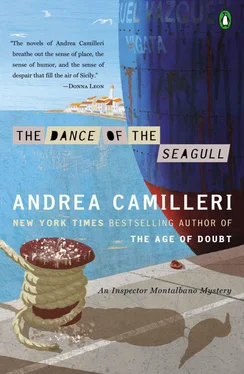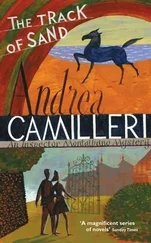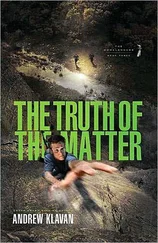His name was Mallia and he’d listened almost distractedly while the inspector reviewed the situation for him.
“We have to wait until my deputy gets here,” said Montalbano.
“Well, we’re going to go ahead anyway and check things out. That’ll save us a little time. We’ll meet back up at the first well.”
“Do you know where they are?”
“Of course, just over a quarter mile from here. A couple of years ago I pulled a corpse out of one,” said Mallia.
A good start is the best of guides, as the poet said. Without anyone noticing, Montalbano superstitiously touched his cojones to ward off bad luck.
At last Mimì pulled up in his car. A squad car came up behind him, with Gallo at the wheel, accompanied by Galluzzo and a young new officer, Lamarca, who seemed like a bright, alert kid.
The three wells had been dug some thirty years ago, about a hundred yards apart from one another, and were linked by a sort of narrow goat track. The land, about thirty hectares in all, had belonged for generations to the Fradella family, who, though good farmers, had never been able to grow a single tree there, or plant a square yard of any kind of plant whatsoever. It was useless land, all of it. Since legend had it that long ago some brigands had raped and killed a poor peasant girl there, everyone believed that the land yielded nothing because it was cursed. And so the Fradellas summoned a hermit priest from Trapani province who knew how to fight the devil. Not even he was able to make so much as a blade of grass grow. The ground was sterile because it was arid, but perhaps only a little water would suffice to change everything. Then, about thirty years ago, Joe Fradella returned from America, where he owned a ranch, and he explained to his relatives that he knew an extraordinary diviner who could find water even in the middle of the Sahara desert. And he brought the rhabdomancer from America, at his own expense. The moment the diviner took a little walk around the area, he said:
“There’s a whole sea of water under the ground here!”
And so the Fradellas dug the first well, and about a hundred feet down the water started coming up nice and fresh. They dug another two, and within about two years’ time, the land, irrigated by a round-the-clock system of pipes and canals, started to turn green. And whatever they planted there grew. In short, those thirty hectares became a sort of paradise on earth. Then the regional government decided to build a new high-speed road between Montelusa and Trapani. A public works project of great importance, the politicians said. The road was to pass straight through Monte Scibetta, and so they dug a tunnel that pierced the mountain from one end to the other. But once the tunnel was finished, everything else came to an end, too. That is, the high-speed road was never made, because the only thing that moved at high speed in the whole affair was the money allocated for it, which raced straight into the pockets of the contractors and local Mafia. And the kicker was that, from one day to the next, the water under the Fradellas’ land, which was right up against the mountain, disappeared. The hole created by the tunnel had shifted the aquifer. And so the land went back to being what it had always been: arid and unproductive.
Since that time, the dry wells had started being used as convenient, anonymous tombs.

After the fireman had been lowered into the first well, duly strapped and attached to a windlass, and found nothing, all the men and equipment moved on to the second well. There, the fireman had descended about twenty yards down when he signaled that he wanted to be pulled back out.
“But he didn’t go down to the bottom,” the inspector observed.
“Apparently there’s a problem,” said Mallia.
When he’d returned to the top, the fireman said:
“I need a mask.”
“Is there not enough air down there?”
“There’s enough air, but there’s a terrible smell of rotting flesh.”
Montalbano felt as if he’d been punched in the stomach. He turned pale and didn’t even have the strength to speak. He felt like throwing up. Augello spoke in his stead:
“Did you see . . . whether . . .”
“I didn’t see anything. I only smelled.”
Having noticed the change in Montalbano, the fire chief Mallia cut in.
“It’s not necessarily a human body, you know. It could easily be a sheep or a dog . . .”
The fireman put on a mask and went back down. Mimì took Montalbano by the arm and pulled him aside.
“What’s wrong with you? That can’t be Fazio.”
“Why not?”
“Because his body wouldn’t have had the time to . . . to be in that condition.”
Augello was right, but that didn’t prevent Montalbano from continuing to feel a sort of inner trembling.
“Why don’t you go sit in the car and rest a little? If there’s any new development, I’ll come and get you.”
“No.”
He would never have managed to sit still. He needed to walk, maybe even around the well like a donkey attached to a millstone, as the others looked on with concern.
The fireman came back up.
“There’s a dead body.”
Despite Augello’s words, Montalbano felt a wave of nausea overwhelm him. As he leaned against a car, vomiting up his soul, he heard the fireman add:
“From the look of it, I’d say it’s been there for at least four or five days.”
“We have to pull it out,” said the chief.
“That’s not going to be easy,” the fireman commented.
Montalbano meanwhile had recovered somewhat from the malaise that had come over him. He’d felt a sort of electrical current run through his body from his brain down to the tips of his toes, and a bitter, acidic taste like regurgitation in his mouth. But if the body had been dead for four or five days, then Augello was right, it couldn’t be Fazio. Except that this logical, reassuring consideration had only come afterwards, after the fright had already done its damage. All the same, Fazio’s disappearance was eating him alive. He would have given anything, his money and his health, to find him.
“Have you got the right equipment for pulling him up?” he asked Mallia.
“Of course.”
“Then, Mimì, inform the prosecutor, Forensics, and Dr. Pasquano.”
“Can we start right away, or do we have to wait for those gentlemen to get here?” the fire chief asked.
“It’s better to wait. Meanwhile we can go and have a look at the third well.”
“Are you thinking the person we’re looking for is not the one we found?”
“At this point I’m absolutely certain.”
“But—”
“You have a problem with that?” the inspector asked, immediately turning defensive.
He wasn’t in the mood for any disagreement at that moment.
“No,” said Mallia. “I didn’t mean in any way to . . . Listen, we can go and check the third well, just not right now, but as soon as we’re done pulling out the body in this one. Moving the equipment and setting it back up is tiring and complicated, you see. Do you understand?”
He understood. With a tugging heart, and against his will, he understood.
“Okay, all right.”
Zito, who’d been standing aside the whole time, came up to him. He realized the situation his friend was in. He knew what kind of relationship Montalbano and Fazio had.
“Salvo, do you think I can call the studio?”
“Why?”
“If it’s all right with you, I’d like to have someone come and cover this. It’s important for us.”
He did owe Nicolò a good turn, by way of thanks. If not for him, he would still be searching for Fazio around the port.
“Go ahead.”
Читать дальше













